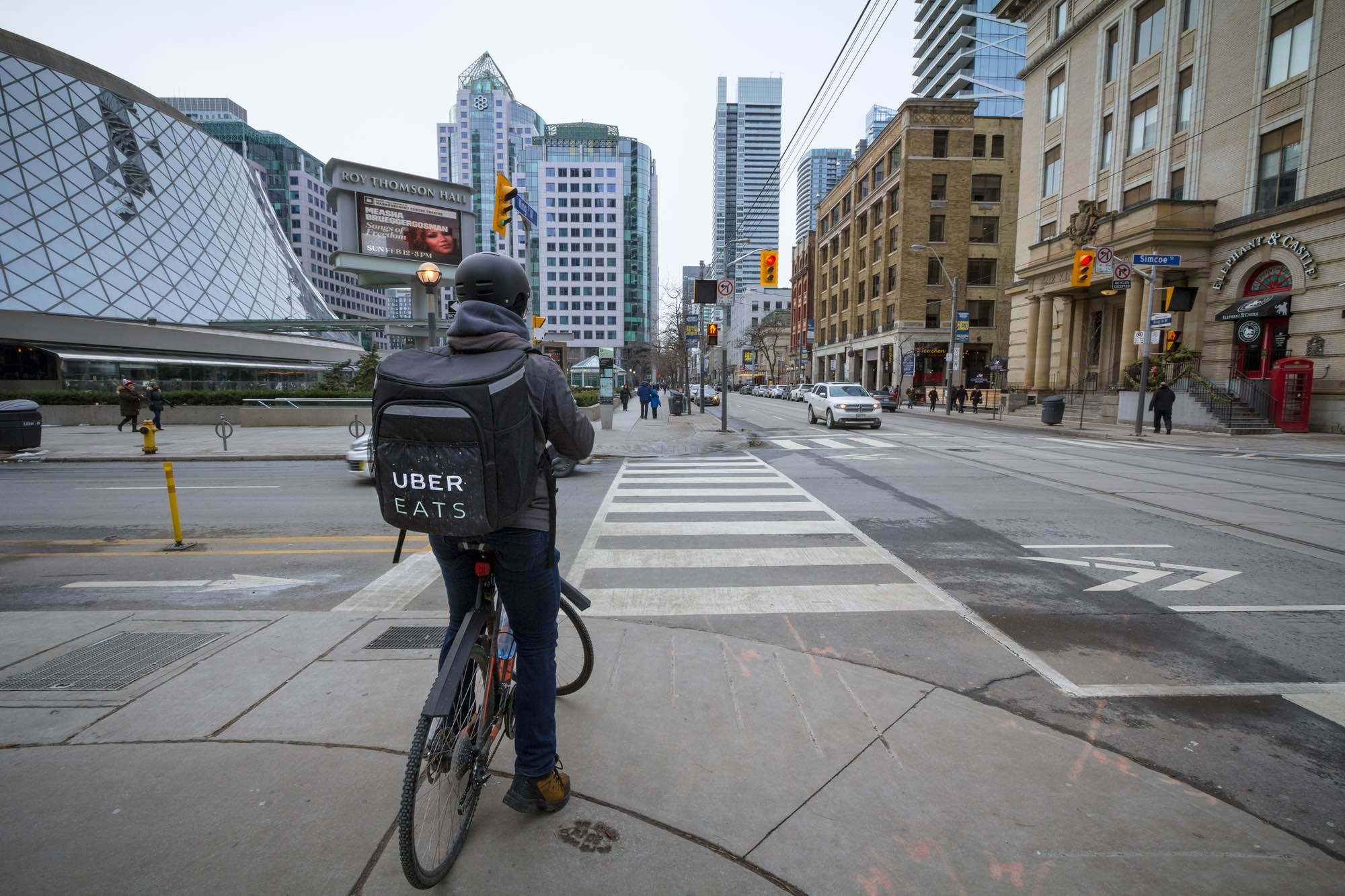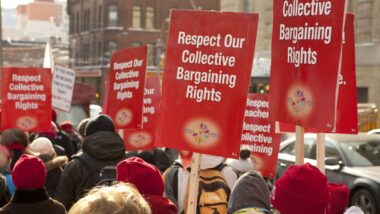Top Class Actions’s website and social media posts use affiliate links. If you make a purchase using such links, we may receive a commission, but it will not result in any additional charges to you. Please review our Affiliate Link Disclosure for more information.
The Supreme Court of Canada ruled in favour of Uber drivers who initiated a class action lawsuit against Uber. The Supreme Court’s decision on June 26 clarifies numerous aspects of contract law, most notably, the common law concept of unconscionability.
If you are wondering whether your employment contract, or any other contract you have entered into is fair or enforceable in court, the Supreme Court’s Uber driver class action lawsuit Canada decision will likely shed light on those questions. This precedent-setting case is predicted to change Canadian courts’ attitude toward certain contracts, opening the door to more successful employment and consumer related class action lawsuits in Canada.
The Supreme Court of Canada’s eight-to-one decision held that a clause requiring Uber drivers to settle disputes with the multinational corporation via arbitration in the Netherlands was unconscionable and therefore void, and that an application to certify a class action lawsuit against the company could proceed in Ontario.
As a result of the Supreme Court’s decision, the Ontario Superior Court may proceed to consider the Uber driver class action lawsuit, which alleges that Uber drivers are entitled to rights conferred on employees under that province’s Employment Standards Act. Recently, a California court ruled that Uber and Lyft drivers are employees.
Heller v. Uber: What Happened?
David Heller, an Ontario Uber and UberEATS driver, filed a $400 million class action lawsuit on behalf of all Uber drivers in the province. Aside from damages, he sought a declaration that Uber drivers are employees who are entitled to benefits, such as minimum wage and overtime pay.
Uber functions by licensing a “driver app” to drivers, who download the app and use it to open an account with Uber to become a driver. In turn, consumers request and accept rides from drivers via the rider app, through which they pay and rate drivers’ performance. Uber then charges drivers a fee in exchange for providing the app.
Uber has been around in Ontario since February 2012. Under the Uber Service Agreement, a driver is granted a licence to use the driver app and obtain the carriage service, agrees to pay a service fee and acknowledges that the agreement creates a legal and direct business relationship. However, the agreement also states that the parties are not in an employment relationship. To accept the licensing agreement, which is approximately 14 pages long, the drivers click a hyperlink on the screen of the app stating “I agree,” twice. The Uber Service Agreement also consists of an arbitration clause, requiring legal issues to be heard in arbitration in the Netherlands.
David began working for Uber in 2016 as an UberEATS driver. He earned approximately $20,800-$31,200 per year, before taxes and expenses, for a 40- to 50-hour workweek.
In January 2017, David commenced the Uber driver class action lawsuit Canada, but before the class action lawsuit was certified by the courts, Uber moved for an order staying the proposed lawsuit in favour of arbitration in the Netherlands. Ontario’s Superior Court granted Uber’s motion on the basis of the arbitration clause. The Court also rejected David’s argument that the arbitration clause was unconscionable.
David appealed the Superior Court’s decision to the Ontario Court of Appeal. In a unanimous decision, the Court of Appeal set aside the stay, and Uber appealed to the Supreme Court of Canada.
What is an Unconscionable Contract?
The doctrine of unconscionability is well-established in Canadian common law, and is generally defined as taking undue advantage of an inequality in bargaining power. According to the Supreme Court in the Uber driver class action lawsuit, the doctrine of unconscionability is an equitable exception to the proposition that contracts, including arbitration agreements, must always be enforced.
An unconscionable contract will typically be so one-sided that it is unfair to one party. It usually leaves one party with no real, meaningful choice due to significant inequalities in bargaining power between the parties.
Consumer and employment contracts may often fall into the “unconscionable contract” category for various reasons. For example, a consumer contract may be unconscionable where one party is an experienced dealer in a type of business, such as a car dealership, while the other party is an average consumer.
As is often the case, the business dealer might require the consumer to sign a standard form contract. Long and complex clauses flaunting technical and legal jargon are often buried in such contracts. Most consumers without a legal background would not understand such clauses. Another example is where the business dealer uses very small font and inserts the clause in a way that purposefully misleads consumers into signing on unfair terms.
In this case, the consumer contract may be declared unconscionable in court, due to the unequal bargaining power between the parties, and the fact that the business dealer used its knowledge and experience to take advantage of the consumer. Where a court finds a contract unconscionable, the contract will be declared void and unenforceable.
Unconscionable Uber
In the Uber driver class action lawsuit Canada some of the ingredients for an unconscionable contract were present: The arbitration clause was part of an unnegotiated 14 page standard form contract. Additionally, there was an evident inequality in bargaining power between Uber and Uber drivers.
In its determination of whether the contract between Uber and its drivers was unconscionable, the Supreme Court used an unconscionability test.
Traditionally, the Canadian unconscionability test requires the presence of:
- A grossly unfair and improvident transaction;
- A victim’s lack of independent legal advice or other suitable advice;
- An overwhelming imbalance in bargaining power caused by the victim’s ignorance of business, illiteracy, ignorance of the language of the bargain, blindness, deafness, illness, senility, or similar disability; and
- The other party’s knowingly taking advantage of this vulnerability.
However, the Court shed some of the requirements, shaping the way in which unconscionability will be determined in future cases. Instead of employing the traditional four-part test, the Supreme Court rejected this approach: “This four-part test raises the traditional threshold for unconscionability and unduly narrows the doctrine, making it more formalistic and less equity-focused.”
Rather, the Supreme Court first determined whether there was an imbalance of bargaining power. When one party has no choice or does not understand the terms of the agreement they are signing, it puts them in a weaker position and allows the stronger party to have an advantage.
For example, consumers or potential employees often sign one-sided and unfair contracts unbeknownst to them. Such contracts may appear in the form of a service or consumer contract online, where the consumer must click “Agree to the Terms and Conditions” in order to benefit from the service or be employed, as was the case in the Uber driver class action lawsuit. Consumers and potential employees often do not thoroughly read through such contracts, especially given that they are usually long and complex.
The second part of the Court’s analysis was whether the bargain between Uber and drivers was improvident. According to the Supreme Court, “a bargain is improvident if it unduly advantages the stronger party or unduly disadvantages the more vulnerable.” An improvident bargain is measured at the time the contract is formed and is assessed contextually. Additionally, this part of the test looks at whether the stronger party has been unduly enriched in addition to the presence of an imbalance of bargaining power.
The Supreme Court explained this part of the analysis as taking on many forms. “For a person who is in desperate circumstances, for example, almost any agreement will be an improvement over the status quo. In these circumstances, the emphasis in assessing improvidence should be on whether the stronger party has been unduly enriched. This could occur where the price of goods or services departs significantly from the usual market price.”
In cases where the weaker party, such as a consumer or potential employee, did not understand or appreciate the meaning of important contractual terms, such as an arbitration clause, courts focus on whether the weaker party was unduly disadvantaged by the terms it did not understand.
Implications for Employees and Consumers
The Uber driver class action lawsuit Canada has many implications for employees, especially in terms of employment contracts. This case clarifies that employers cannot include unfair terms in their contracts or releases, in an attempt to limit an employee’s entitlements. The Supreme Court recognized that there is an imbalance of bargaining power between employees and employers, and set a legal precedent for protecting employees from having their entitlements limited in order to benefit the employer. Importantly, unfair terms can extend to any breach of the Employment Standards Act or applicable provincial legislation.
Another key implication of the Supreme Court’s ruling is that the imbalance of bargaining power is not only recognized at the outset of the employment relationship, but it is also recognized throughout the relationship.
In terms of consumers, the Uber driver class action lawsuit constitutes a precedent for less stringent unconscionability tests. The Supreme Court highlighted that the traditional threshold for determining the presence of an unconscionable contract was too strict, and focused on the position of the two parties and the context surrounding the contract, which can benefit consumers who entered into unfair contracts.
What do you think about the Supreme Court’s decision on the Uber driver class action lawsuit? Tell us your thoughts in the comment section below!
David and potential Class Members are represented by Lior Samfiru.
The Uber Driver Class Action Lawsuit Supreme Court Decision is Uber Technologies Inc., et al. v. Heller, Case No. 38534, in the Supreme Court of Canada.
Read More Class Action Lawsuit & Settlement News:
Supreme Court Green Lights Uber Drivers’ Class Action Lawsuit
Long-Term Disability Lawyer | Insurance Claim Denial Help
Canada Roundup Glyphosate Cancer Class Action Lawsuit Investigation
Huawei Nexus P6 Battery Class Action Lawsuit Finally Authorized
ATTORNEY ADVERTISING
Top Class Actions is a Proud Member of the American Bar Association
LEGAL INFORMATION IS NOT LEGAL ADVICE
Top Class Actions Legal Statement
©2008 – 2024 Top Class Actions® LLC
Various Trademarks held by their respective owners
This website is not intended for viewing or usage by European Union citizens.

















